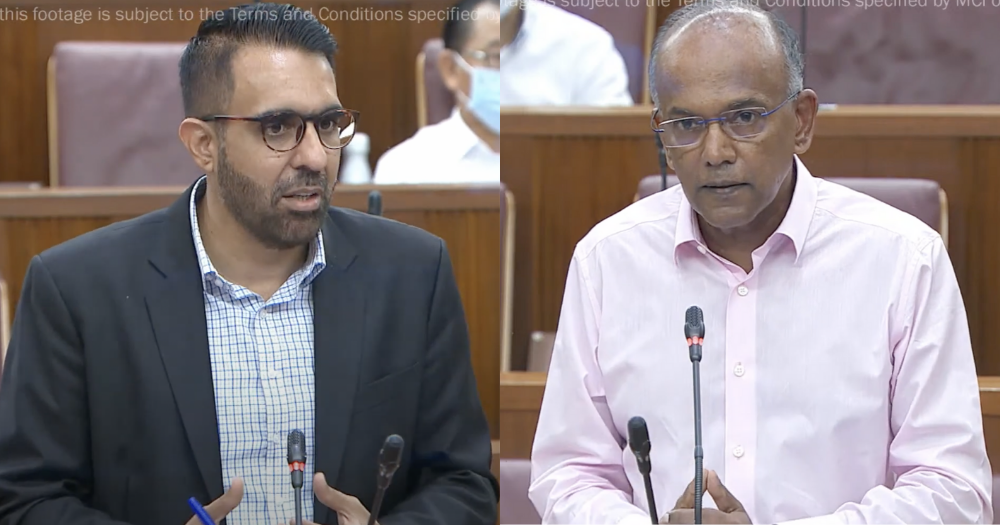Follow us on Telegram for the latest updates: https://t.me/mothershipsg
In his closing speech during the debate on the Foreign Interference (Countermeasures) Bill (FICA) on Monday (Oct. 4), Minister for Home Affairs and Law K Shanmugam criticised the way the debate had gone, claiming that the Workers' Party (WP) Members of Parliament (MPs) did not "substantively engag[e]" with anything that he had said.
He claimed that the WP failed to give practical answers to questions that he had posed, and that what had occurred over the nearly 10 hours prior was "not a debate".
WP MPs call for more checks and balances
The WP MPs had proposed a number of amendments to the Bill, with the aim of including "oversight of Executive action by the Judiciary", and a more "precise scoping" of the government's powers to "significantly lower the likelihood of abuse of power".
In the earlier part of the debate, Shanmugam had indicated that he would accept some of the WP's proposed amendments for the bill aimed at countering foreign interference, while rejecting the majority of their proposals.
WP MPs Jamus Lim, He Ting Ru, Leon Perera, and Gerald Giam spoke at length on Monday about their proposed amendments, raising concerns about potential overreach that the Bill could facilitate and calling for more checks and balances to be implemented.
In his speech, Leader of the Opposition Pritam Singh said that the WP rejects the proposed appeals mechanism — a reviewing tribunal — and instead proposed an amendment to introduce more transparency, by allowing for appeals to the Home Affairs Minister, and thereafter to the High Court with full judicial scrutiny.
Singh also said that it was "wholly incongruous" for the government not to seek public feedback on the controversial bill, while acknowledging that the Singaporean public today desires greater checks and balances.
"Rhetoric alone doesn't solve problems"
Referencing Singh's speech, Shanmugam said:
"Mr. Singh spoke about the need for engagement and responding to feedback. But it appears to me that the Workers' Party has really not substantively engaged with anything that I have said."
"You can come to this House and have soaring rhetoric", he stated. However, "Rhetoric alone doesn't solve problems."
He claimed that the WP MPs had failed to give practical answers — "not just rhetoric" — to his questions, which included:
- How do checks need to be made suitable for the context and the risks Singapore faced in the overall legal landscape?
- How do you deal with the risks of leaks in Open Court hearings, or in camera?
- What objections are there are to the tribunal chaired by a High Court judge?
"No answer. I would say, not a squeak," Shanmugam said. "What we had was not a debate because we’re not dealing with these points."
He added:
"Parliament is not just a forum for reading out speeches with an intent of putting it out in social media eventually. We need to engage on the issues."
Singapore accepts separation of powers
Shanmugam stated that the Rule of Law is "fundamental to our existence, and our well-being as a country":
"We accept separation of powers. If we did not, and if we did not have rule of law in Singapore, I wouldn’t be here, Mr. Singh wouldn’t be here, this Chambers would not look like this, and Singapore would not be like this. In fact, none of you will be here."
However, he added that Singapore has never taken an absolutist approach, as it will not work.
He said that one should not be "colonised in our minds" that there is only one way of doing things properly.
Responding to the WP's rejection of the tribunal as the appeals mechanism, Shanmugam asked whether the WP would be of the opinion that tribunals established under certain laws — the Internal Security Act (ISA), the Criminal Law (Temporary Provisions) Act (CLTPA), the Land Acquisition Act, and other pieces of legislation — should also be abolished because they "offen[d] the principles of separation of powers and the rule of law?"
"If the Workers’ Party’s position is taken to its extreme, as I said, we will have to do away with the CLTPA, the ISA, the Maintenance of Religious Harmony Act, and the Land Acquisition Act. All the laws that have worked well for us."
In his opening speech, Shanmugam had said that it would not be feasible for the appeals to go through the court process, due to the potentially highly-secret information that would then need to be shared publicly and the fact that, in certain cases of intel, there may be no documents to show or witnesses to testify in court.
In his closing speech, he restated this:
"The judicial process will not be appropriate in matters where we rely heavily on sensitive intelligence, collaboration with foreign counterparts, many things cannot be publicly disclosed."
He said that he had heard nothing in response to his explanations:
"There is such a thing called political will and political courage, and that will have to be a recognition that judicial process will not be appropriate.
So Parliament is not just a place where you come and because you are seeing that some people are saying certain things or you resort to rhetoric without offering real suggestions.
It requires some courage to say this is a problem and we deal with it. This is the way we will deal with it and offer solutions, alternate solutions."
Top photos via MCI.
Follow and listen to our podcast here
If you like what you read, follow us on Facebook, Instagram, Twitter and Telegram to get the latest updates.
